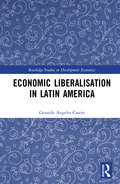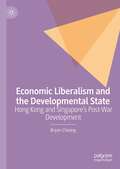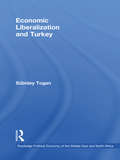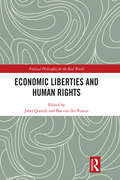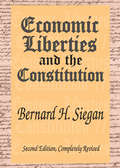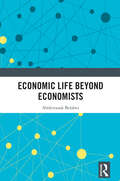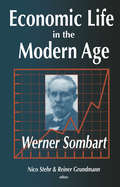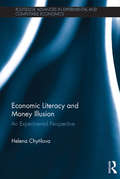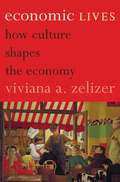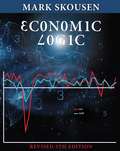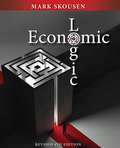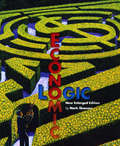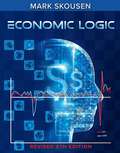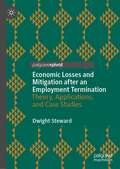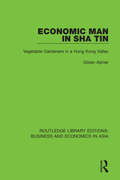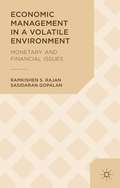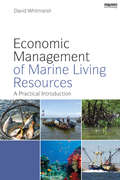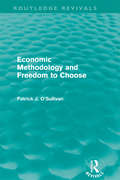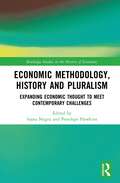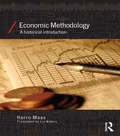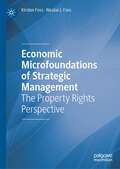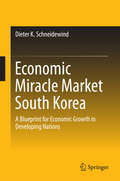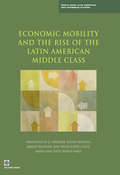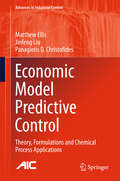- Table View
- List View
Economic Liberalisation and Indian Agriculture
by G S Bhalla Gurmail SinghEconomic Liberalisation and Indian Agriculture is an in-depth study that throws light on the changes in Indian agriculture post the economic liberalisation of early 1990s. It provides a district-wise analysis on agricultural growth in India from the beginning of liberalisation to the period of slowdown in agriculture and rising farmer distress. The study undertakes an analysis of the spatial patterns of change in Indian agriculture at the state level during 1962-65 to 2005-08. The authors make use of detailed data for 281 district units for a comprehensive discussion of the changes in the cropping patterns and levels of agricultural output at the state and all-India levels during this period. The strength of this book lies in the fact that it combines theory and practice, tabular and econometric techniques, as well as statistical measures to analyse significant issues related to agriculture in India. This volume is a valuable addition to the existing literature on agriculture and will be of immense benefit to practitioners in the field of Agricultural Economics.
Economic Liberalisation in Latin America (Routledge Studies in Development Economics)
by Gerardo Angeles-CastroThis book explores the process of economic liberalisation in Latin America and revises the transition from the import substitution industrialisation model to market-oriented reforms. It explains the theoretical foundations of the neoliberal paradigm and the implications of the policies that were labelled as the Washington Consensus. The book also incorporates an assessment on the socio-political norms added to the orthodox prescription, the so-called Post-Washington Consensus. The study comprises a general analysis on the subcontinent and on different economic liberalisation paths, and looks at four country case studies: Mexico, Brazil, Chile, and Uruguay, from the 1980s to recent years. From this approach, the reader can analyse weaknesses and strengths, the socioeconomic performance, and the difficulties that Latin America has presented through the turbulent process of economic liberalisation, both at an early stage and over the long run, by means of country case studies encompassing the most diverse and representative styles of economic openness in the subcontinent. This allows them to identify the challenges the country faces and the appropriate policies they can follow to cope with sustained economic growth, poverty reduction, and income distribution within an economically open environment. The study is carried out by analysing and contrasting theoretical and empirical perspectives, allowing a broader understanding of the topics. The book is complementary reading for textbooks, due to the objectivity with which it addresses important and quotidian issues in the region, associating empirical and theoretical topics, and facilitating the understanding of the international political economy of Latin America. It is also suitable for practitioners and researchers, because of the depth in which it covers specific topics and the useful analysis it conducts to incorporate policy implications and suggestions for achieving equitable growth in a context of liberal markets.
Economic Liberalism and the Developmental State: Hong Kong and Singapore’s Post-war Development
by Bryan CheangThis book provides a fresh perspective on the debate over the role of the state in East Asia’s development history. Comparing the post-war development policies of Singapore and Hong Kong, it argues that their strong economic performances preceded and persisted despite, not because of, developmental state policies. While both nations are not pure free markets, the Hong Kong economy comes closer to that ideal and exhibited clear advantages over state-driven Singapore, in terms of greater levels of indigenous entrepreneurship, productivity and innovation.The book highlights the complex ways in which states penetrate markets, which are often neglected in liberal accounts of Hong Kong and Singapore as ‘free-market success stories’. At the same time, it also stands as a cautionary tale on the use of non-comprehensive development planning in the twenty-first century, where an unprecedented degree of complexity complicates economic policy and industrial upgrading. The book renews the case for economic liberalism in development policy through a unique Asian cultural lens.
Economic Liberalization and Turkey (Routledge Political Economy of the Middle East and North Africa)
by Sübidey ToganThe liberalization of the Turkish economy is a key factor affecting Turkey’s application to join the European Union. This book examines the impact of economic liberalization in Turkey and Turkey’s approach to the elimination of barriers to trade. It focuses on the liberalization of trade in Turkey’s agricultural and industrial commodities sector and key services such as telecommunications, electricity, natural gas, banking and transport. The chapters include thorough discussions on WTO and EU approaches for the elimination of barriers to trade, international and EU rules and regulations in the various service sectors, and the methods for estimating the tariff equivalents of barriers to trade in the different service sectors as well as methods for estimating the benefits of liberalization of services for Turkey. The experience of Turkey, its approach to liberalization and its measures to eliminate barriers to trade serve as a useful model for other neighboring countries of the European Union.
Economic Liberties and Human Rights (Political Philosophy for the Real World)
by Jahel Queralt Bas Van Der VossenThe status of economic liberties remains a serious lacuna in the theory and practice of human rights. Should a minimally just society protect the freedoms to sell, save, profit and invest? Is being prohibited to run a business a human rights violation? While these liberties enjoy virtually no support from the existing philosophical theories of human rights and little protection by the international human rights law, they are of tremendous importance in the lives of individuals, and particularly the poor. Like most individual liberties, economic liberties increase our ability to lead our own life. When we enjoy them, we can choose the occupational paths that best fit us and, in so doing, define who they are in relation to others. Furthermore, in the absence of good jobs, economic liberties allow us to create an alternative path to subsistence. This is critical for the millions of working poor in developing countries who earn their livelihoods by engaging in independent economic activities. Insecure economic liberties leave them vulnerable to harassment, bribery and other forms of abuse from middlemen and public officials. This book opens a debate about the moral and legal status of economic liberties as human rights. It brings together political and legal theorists working in the domain of human rights and global justice, as well as people engaged in the practice of human rights, to engage in both foundational and applied issues concerning these questions.
Economic Liberties and the Constitution
by Bernard H. SieganIn this seminal work, Bernard Siegan traces the history of onstitutional protection for economic liberties in the United States. He argues that the law began to change with respect to economic liberties in the late 1930s. At that time, the Supreme Court abdicated much of its authority to protect property rights, and instead condoned the expansion of state power over private property.Siegan brings the argument originally advanced in the .first edition completely up to date. He explores the moral position behind capitalism and discusses why former communist countries flirting with decentralization and a free market (for instance, China, Cambodia, Vietnam, and Laos) have become more progressive and prosperous as a result. He contrasts the benefits of a free, deregulated economy with the dangers of over-regulation and moves towards socialized welfare most specifically as happened during Franklin Roosevelt's presidency. Supporting his thesis with historical court cases, Siegan discusses the past and present status of economic liberties under the Constitution, clarifies constitutional interpretation and due process, and suggests ways of safeguarding economic liberties.About the original edition, Doug Bandow of Reason noted, "Siegan has written a vitally important book that is sure to ignite an impassioned legal and philosophical debate. The reason the necessity for protecting economic liberty is no less than that guaranteeing political and civil liberty." Joseph Sobran of the National Review wrote, "Siegan...makes a powerful general case for economic liberty, on both historical and more strictly empirical grounds.... Siegan has done a brilliant piece of work, not only where it was badly needed, but where the need had hardly been recognized until he addressed it." And Edwin Meese remarked that, "This timely and important book shows how far we have drifted from protecting basic liberties that the Framers of the Constitution sought to secure. I recommend it highly." This new, completely revised edition of Economic Liberties and the Constitution will be essential reading for students of economics, history, public policy, law, and political science.
Economic Life Beyond Economists
by Abderrazak BelabesThrough an examination of the work of great scholars from fields including philosophy, literature, philology, semiology, quantum physics, history, and anthropology, this book argues that building on the contribution of non-economists can open new areas of reflection in economics beyond the usual schools of thought. The purpose of the book is twofold. First, it offers a critique and discussion of the limits of contemporary economic discourse, both mainstream and self-styled alternative theories. The central theme on which the book is built is that the discipline of economics fails to examine the nature of social reality in a systematic way. This prompts the economists to become fully aware of the methodology on which they base their representation, analysis, and argumentation in a way that economists currently are not. Second, the book proposes alternative ways of thinking that can help readers of economics to overcome the current limitations of their discipline. This means going beyond various dominant dualities – orthodox/heterodox, micro/ macro, epistemology/ontology – because it is not a question of doing ‘the economy’ differently, but of overcoming the economy as a representation of the world that strives to submit everything to its realm. Thus, the book does not simply propose a broader conceptual framework than that portrayed by mainstream economists or those who propose an alternative approach but raises questions that do not usually come from the minds of economists at all. The book will be of particular interest to readers of economic methodology and pluralism, philosophers of science, and other social scientists interested in methodological issues.
Economic Life in the Modern Age
by Werner SombartWerner Sombart (1863-1941) may well have been the most famous and controversial social scientist in Germany during the early twentieth century. Highly influential, his work and reputation have been indelibly tainted by his embrace of National Socialism in the last decade of his life. Although Sombart left an enormous opus spanning disciplinary boundaries, intellectual reaction to his work inside and outside of Germany is divided and ambivalent. Sombart consistently responded to the social and political developments that have shaped the twentieth century. Economic Life in the Modern Age provides a representative sampling of those portions of Sombart's work that have stood the test of time.The volume opens with a substantial introduction reviewing Sombart's life and career, the evolution of his major intellectual concerns, his relation to Marx and Weber, and his political affiliation with the Nazis. The editors' selection of texts emphasizes areas of Sombart's economic and cultural thought that remain relevant, particularly to those intellectual trends that seek a more broadly based, cross-disciplinary approach to culture and economics. Sombart's writings on capitalism are represented by essays on the nature and origin of the market system and the diversity of motives among the bourgeoisie and the proletariat. Also included is an excerpt from Sombart's controversial The Jews and Modern Capitalism, exploring the widely perceived relation between economic life and Judaism as a religion. In essays on the economics of cultural processes, Sombart's comprehensive and expansive idea of cultural science yields prophetic insights into the nature of urbanism, luxury consumption, fashion, and the cultural secularization of love. The volume's final section consists of Sombart's reflections on the social influences of technology, the economic life of the future, and on socialism, including the influential essay "Why is there no Socialism in the United States."Encapsulating the most valuable aspects of his work, Economic Life in the Modern Age provides clear demonstration of Sombart's sense for fine cultural distinctions and broad cultural developments and the predictive power of his analyses. It will be of interest to sociologists, economists, political scientists, and specialists in cultural studies.Nico Stehr is professor at the Max Planck-Instit³t f³r Meteorologie in Hamburg. Reiner Grundmann is professor at the Aston Business School of Aston University in Birmingham, U.K.
Economic Literacy and Money Illusion: An Experimental Perspective (Routledge Advances in Experimental and Computable Economics)
by Helena ChytilovaThe concept of money illusion, a recently resurrected phenomenon of behavioral economics, is a real fact of economic life, the potential role of which should no longer be dismissed. Despite money illusion being utterly suppressed by mainstream economists, small deviations from rationality, together with trends in behavioral economics, alleviate the denial of money illusion induced by the rational expectations revolution. This book argues that money illusion seems to be a ubiquitous phenomenon, affecting various areas such as financial markets, housing markets, labor markets, consumption-saving decisions, and even development at the aggregate level induced by coordination issues. Furthermore, in light of the educational efforts of central banks and other institutions, it is worth considering whether solid economic training would provide guidance for the public regarding their decision-making and thereby alleviate the effects of money illusion. The emerging field of experimental economics provides a unique opportunity for us to verify the presence of money illusion. Specifically, attention is devoted to the experimental investigation of reduction in the direct and indirect effects of money illusion with respect to the level of economic literacy acquired through economic education. Economic Literacy and Money Illusion will be of interest to the general audience and to those who are interested in behavioral economics, economics education, and experimental economics, as well as to policy makers and institutions. Last but not least, it will help develop students’ interest in alternative economic theories. NB. The research and writing of this book was made possible with the support of the University of Economics, Prague, Faculty of Economics, Department of Economics.
Economic Lives: How Culture Shapes the Economy
by Viviana A. ZelizerRevealing the human side of economic lifeOver the past three decades, economic sociology has been revealing how culture shapes economic life even while economic facts affect social relationships. This work has transformed the field into a flourishing and increasingly influential discipline. No one has played a greater role in this development than Viviana Zelizer, one of the world's leading sociologists. Economic Lives synthesizes and extends her most important work to date, demonstrating the full breadth and range of her field-defining contributions in a single volume for the first time.Economic Lives shows how shared cultural understandings and interpersonal relations shape everyday economic activities. Far from being simple responses to narrow individual incentives and preferences, economic actions emerge, persist, and are transformed by our relations to others. Distilling three decades of research, the book offers a distinctive vision of economic activity that brings out the hidden meanings and social actions behind the supposedly impersonal worlds of production, consumption, and asset transfer. Economic Lives ranges broadly from life insurance marketing, corporate ethics, household budgets, and migrant remittances to caring labor, workplace romance, baby markets, and payments for sex. These examples demonstrate an alternative approach to explaining how we manage economic activity—as well as a different way of understanding why conventional economic theory has proved incapable of predicting or responding to recent economic crises.Providing an important perspective on the recent past and possible futures of a growing field, Economic Lives promises to be widely read and discussed.
Economic Logic Fifth Edition
by Mark SkousenIn Economic Logic, Mark Skousen offers a step-by-step approach to economics showing how microeconomics and macroeconomics are logically linked together. <P><P> The fully revised fifth edition introduces a major breakthrough in macroeconomics: a "top line" in national income accounting called Gross Output. Also included: a powerful four-stage universal model of the economy, a new "growth" diagram, a new diagram of the optimal size of government, and new alternatives to the standard Aggregate Supply and Aggregate Demand curves. Economic Logic is also the first and only textbook to begin with a profit-and-loss income statement to demonstrate the dynamics of the economy. To aid students in comprehending the economic lessons, many other disciplines are integrated into the study of economics, including finance, business, marketing, management, history, and sociology.
Economic Logic Fourth Edition
by Mark Skousen"Eureka! Skousen has done the impossible. Students love it! I will never use another textbook again."-Harry Veryser, University of Detroit-MercyThey said it couldn't be done. Austrian economics is so different, they said, that it couldn't be integrated into standard "neo-classical" textbooks. Consequently, college students learn nothing about the great Austrian economists (Mises, Hayek, Schumpeter).Professor Mark Skousen's Economic Logic aims to change that. Based on his popular course taught at Columbia University, Skousen starts his "micro" section with Carl Menger's "theory of the good" and the profit-and-loss income statement to explain the dynamics of the market process, entrepreneurship, and the advantages of saving.Then he uses a powerful Hayekian four-stage model of the economy to introduce "macro," including a new Austrian measure of spending at all stages of production (Gross Domestic Expenditures).Economic Logic also offers chapters on:The international gold standard, the defects of central banking, and the Mises/Hayek theory of the business cycle.A full critique of the Keynesian Aggregate Supply and Demand (AS-AD) model, and a revolutionary Austrian alternative.Entrepreneurship, the financial markets, environmental economics, monetary policy and inflation, federal spending and taxes, and government regulation.Leaders of all schools, including Austrian, Keynesians, Marxist, Chicago, and Public Choice.
Economic Logic Third Edition
by Mark Skousen"Eureka! Skousen has done the impossible. Students love it! I will never use another textbook again."-Harry Veryser, University of Detroit-MercyThey said it couldn't be done. Austrian economics is so different, they said, that it couldn't be integrated into standard "neo-classical" textbooks. Consequently, college students learn nothing about the great Austrian economists (Mises, Hayek, Schumpeter).Professor Mark Skousen's Economic Logic aims to change that. Based on his popular course taught at Columbia University, Skousen starts his "micro" section with Carl Menger's "theory of the good" and the profit-and-loss income statement to explain the dynamics of the market process, entrepreneurship, and the advantages of saving.Then he uses a powerful Hayekian four-stage model of the economy to introduce "macro," including a new Austrian measure of spending at all stages of production (Gross Domestic Expenditures).Economic Logic also offers chapters on:The international gold standard, the defects of central banking, and the Mises/Hayek theory of the business cycle.A full critique of the Keynesian Aggregate Supply and Demand (AS-AD) model, and a revolutionary Austrian alternative.Entrepreneurship, the financial markets, environmental economics, monetary policy and inflation, federal spending and taxes, and government regulation.Leaders of all schools, including Austrian, Keynesians, Marxist, Chicago, and Public Choice.
Economic Logic, Sixth Edition
by Mark SkousenIn Economic Logic, Mark Skousen offers a step-by-step approach to economics showing how microeconomics and macroeconomics are logically linked together. The fully revised sixth edition introduces a major breakthrough in macroeconomics: a "top line" in national income accounting called Gross Output. Also included: a powerful four-stage universal model of the economy, a new "growth" diagram, a new diagram of the optimal size of government, and new alternatives to the standard Aggregate Supply and Aggregate Demand curves. Economic Logic is also the first and only textbook to begin with a profit-and-loss income statement to demonstrate the dynamics of the economy. To aid students in comprehending the economic lessons, many other disciplines are integrated into the study of economics, including finance, business, marketing, management, history, and sociology.
Economic Losses and Mitigation after an Employment Termination: Theory, Applications, and Case Studies
by Dwight StewardThis Palgrave Pivot provides a conceptual and practical discussion of the factors that comprise a standard economic damage model in an employment termination case. This book discusses the economic factors and assumptions that comprise an economic damages model in an employment termination case. It also provides a discussion of the valuation of employee fringe benefits and employee stock option valuations. Background on the concept of discounting and discussions of the required information in employment cases are also provided. Readers are able to see the analysis in action, with case studies revolving around highly skilled individuals, less skilled individuals, public sector employees, highly educated individuals, managers and executives, and defamation and damage to reputation.
Economic Man in Sha Tin: Vegetable Gardeners in a Hong Kong Valley (Routledge Library Editions: Business and Economics in Asia #11)
by Göran AijmerThis book, first published in 1980, is a study of how refugee immigrants from China make a living as market gardeners in a valley in Hong Kong. Based on extensive field-work, it examines various aspects of economic life; the discussion concerns the adaptations necessitated on the part of the gardeners by the new socio-economic structures which present themselves. The general problem of agricultural change is discussed and the Hong Kong observations are systematized into a comparative Chinese framework.
Economic Management In A Volatile Environment
by Ramkishen S. Rajan Sasidaran GopalanSince the 1990s, several emerging market economies (EMEs) have, to varying degrees, embraced the process of 'financial globalisation', broadly defined as a set of policies that involve allowing for greater openness to cross-border capital flows as well as greater market access to foreign financial institutions. While the EMEs have surpassed the advanced economies in 2013 by accounting for over half of global output, they are not without their concerns. They have been faced with a variety of policy challenges owing to their increasing integration with global financial markets. This book discusses some of the challenges relating to macroeconomic and financial management in a volatile and uncertain world, brought about by greater financial openness. The emphasis of the book is on exploring the implications of a key set of issues emanating from financial globalisation on EMEs in a rigorous but readable manner.
Economic Management of Marine Living Resources: A Practical Introduction
by David WhitmarshThis textbook has two main objectives. Firstly, it outlines the problems associated with the management and conservation of marine living resources, with particular attention given to the twin concepts of economic value and sustainability. It demonstrates the contribution that economics can make to understanding these problems as well as helping to frame policies to mitigate them. Secondly, it looks in detail at the key methods that may be used to collect and analyse socio-economic data, oriented towards the information needs of decision makers and stakeholders involved in fisheries management. Together, these two objectives address the question: how does society make the best use of its marine living resources?
Economic Methodology and Freedom to Choose (Routledge Revivals)
by Patrick O'SullivanFirst published in 1987, Professor O'Sullivan's work provides an in depth philosophical examination of the foundations of method in Economics and other human sciences. The argument is unabashedly dialectical in the great Socratic-Platonic tradition, and the reissue will be very welcome to all students of methodology, in particular those students of economic methodology seeking a refreshing alternative to yet more mathematical game playing. In an age dominated and perhaps to an extent perplexed by an ultimately non-committal postmodernism the book provides a root and branch critique of the epistemological relativism which must lie at the root of the whole post-modernist approach; and in reasserting the fundamental importance not only for the methods of science but also for European civilisation of the pursuit of truth it takes a stance which is very much against the tide of the times. A heterodox perspective is also provided and defended in detail regarding the real nature of economic methodology whereby it is shown that Economics epitomises a teleological mode of explanation which is significantly different from the efficient causal modes of explanation of the natural sciences. In fact Economics is the ultimate subjectivist/interpretative discipline in the methodological sense of Max Weber and Alfred Schutz, a fact which has only been recognised (and welcomed) in the Austrian school of Economics.
Economic Methodology, History and Pluralism: Expanding Economic Thought to Meet Contemporary Challenges (Routledge Studies in the History of Economics)
by Ioana Negru Penelope HawkinsEconomic Methodology, History and Pluralism: Expanding Economic Thought to Meet Contemporary Challenges pays tribute to Emeritus Professor Sheila Dow (University of Stirling, Scotland). This volume focusses on the contributions of Dow to economic methodology, pluralism and the history of economic thought. These explorations serve to underpin her ideas and theories on macroeconomics, banking and money. Bringing together an impressive panel of contributors, the chapters in this work examine Dow’s writings on structured pluralism and schools of thought, meanings of open and closed systems, reflections on the relationship between economics and other sciences (both social and natural), the methodology of behavioural economics, as well as the political economy of the Scottish school of thought. The book challenges the foundations of the mainstream economics paradigm in a novel and holistic manner, seeking to advance thinking across Dow’s favoured discipline. The essays in this collection provide thought-provoking reading for advanced students and scholars of economic methodology, the history of economic thought, heterodox economics and political economy. The book will also be valued by the economics profession at large, as it contains important elements and ideas concerning ethics, methodology and tolerance within economics as a discipline and as a profession.
Economic Methodology: A Historical Introduction (Economics as Social Theory #35, Part A)
by Harro MaasEver since the inception of economics over two hundred years ago, the tools at the discipline’s disposal have grown more and more more sophisticated. This book provides a historical introduction to the methodology of economics through the eyes of economists. The story begins with John Stuart Mill's seminal essay from 1836 on the definition and method of political economy, which is then followed by an examination of how the actual practices of economists changed over time to such an extent that they not only altered their methods of enquiry, but also their self-perception as economists. Beginning as intellectuals and journalists operating to a large extent in the public sphere, they then transformed into experts who developed their tools of research increasingly behind the scenes. No longer did they try to influence policy agendas through public discourse; rather they targeted policymakers directly and with instruments that showed them as independent and objective policy advisors, the tools of the trade changing all the while. In order to shed light on this evolution of economic methodology, this book takes carefully selected snapshots from the discipline’s history. It tracks the process of development through the nineteenth and twentieth centuries, analysing the growth of empirical and mathematical modelling. It also looks at the emergence of the experiment in economics, in addition to the similarities and differences between modelling and experimentation. This book will be relevant reading for students and academics in the fields of economic methodology, history of economics, and history and philosophy of the social sciences.
Economic Microfoundations of Strategic Management: The Property Rights Perspective
by Nicolai J. Foss Kirsten FossThis book develops a property rights approach to firm strategy and demonstrates how it helps address key challenges in strategic management research. It shows that the property rights approach holds important implications both for entrepreneurship and organizational learning theory.Property rights have direct implications for strategic management, as control over assets has an immediate link to the creation and appropriation of economic value. For a firm to execute a competitive strategy, it must hold rights to appropriate resources.This book will appeal to scholars working in the fields of strategic management, organizational theory and resource allocation. It is an invaluable summary of two decades of groundbreaking research.
Economic Miracle Market South Korea
by Dieter K. SchneidewindThis book explores the historical and economic development of South Korea, its culture, as well as the benefits, opportunities and challenges that German companies have faced in their cooperation with South Korean enterprises. More specifically, it juxtaposes economic-miracle markets such as Japan and West Germany, which rose from the ashes after the Second World War with the help of a century of bustling industrial age, with South Korea, which developed from virtually nothing. The book also addresses why South Korea's history, geography, society, culture and economic capabilities remain widely unknown and unnoticed among westerners, despite South Korean companies being among the global market leaders in a number of industries, particularly in the automobile and hardware segments. Written from the point of view of a seasoned business expert on the country, Economic Miracle Market South Korea is essential reading for business and economics research academics looking to improve their knowledge of this relatively unknown "success story", as well as for practitioners in industry looking to optimize their dealings with South Korean business partners.
Economic Mobility and the Rise of the Latin American Middle Class
by Francisco H. G. Ferreira Julian Messina Jamele Rigolini Luis-Felipe López-Calva Maria Ana Lugo Renos VakisAfter decades of stagnation, the size of Latin America's middle class recently expanded to the point where, for the first time ever, the number of people in poverty is equal to the size of the middle class. This volume investigates the nature, determinants and possible consequences of this remarkable process of social transformation. We propose an original definition of the middle class, tailor-made for Latin America, centered on the concept of economic security and thus a low probability of falling into poverty. Given our definition of the middle class, there are four, not three, classes in Latin America. Sandwiched between the poor and the middle class there lies a large group of people who appear to make ends meet well enough, but do not enjoy the economic security that would be required for membership of the middle class. We call this group the 'vulnerable'. In an almost mechanical sense, these transformations in Latin America reflect both economic growth and declining inequality in over the period. We adopt a measure of mobility that decomposes the 'gainers' and 'losers' in society by social class of each household. The continent has experienced a large amount of churning over the last 15 years, at least 43% of all Latin Americans changed social classes between the mid 1990s and the end of the 2000s. Despite the upward mobility trend, intergenerational mobility, a better proxy for inequality of opportunity, remains stagnant. Educational achievement and attainment remain to be strongly dependent upon parental education levels. Despite the recent growth in pro-poor programs, the middle class has benefited disproportionally from social security transfers and are increasingly opting out from government services. Central to the region's prospects of continued progress will be its ability to harness the new middle class into a new, more inclusive social contract, where the better-off pay their fair share of taxes, and demand improved public services.
Economic Model Predictive Control
by Jinfeng Liu Panagiotis D. Christofides Matthew EllisThis book presents general methods for the design of economic model predictive control (EMPC) systems for broad classes of nonlinear systems that address key theoretical and practical considerations including recursive feasibility, closed-loop stability, closed-loop performance, and computational efficiency. Specifically, the book proposes: Lyapunov-based EMPC methods for nonlinear systems; two-tier EMPC architectures that are highly computationally efficient; and EMPC schemes handling explicitly uncertainty, time-varying cost functions, time-delays and multiple-time-scale dynamics. The proposed methods employ a variety of tools ranging from nonlinear systems analysis, through Lyapunov-based control techniques to nonlinear dynamic optimization. The applicability and performance of the proposed methods are demonstrated through a number of chemical process examples. The book presents state-of-the-art methods for the design of economic model predictive control systems for chemical processes. In addition to being mathematically rigorous, these methods accommodate key practical issues, for example, direct optimization of process economics, time-varying economic cost functions and computational efficiency. Numerous comments and remarks providing fundamental understanding of the merging of process economics and feedback control into a single framework are included. A control engineer can easily tailor the many detailed examples of industrial relevance given within the text to a specific application. The authors present a rich collection of new research topics and references to significant recent work making Economic Model Predictive Control an important source of information and inspiration for academics and graduate students researching the area and for process engineers interested in applying its ideas.

